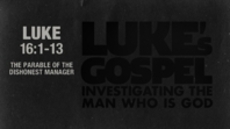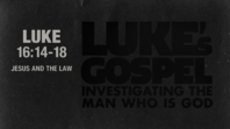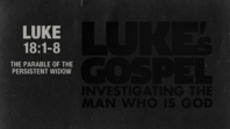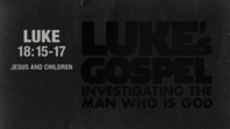
Can’t see the video? Download and install Flash to be able to view. Get Flash Here
Jesus tells a parable about heaven and hell. What does Jesus and the Bible say about what happens to every person upon death? Not naturalism, universalism, reincarnationism, annihilationism, or purgatory. The fate of every man and woman who has or will ever live is this: death, and then either heaven for blessing, or hell for suffering. Those alone are the options. Your eternal destiny is sealed upon your death. This life is your only opportunity. Hell is the wrath of God in effect. If you do not believe in and belong to Jesus, you are in the path of the wrath of God that ultimately culminates in the conscious, eternal torment of hell.
19 “There was a rich man who was clothed in purple and fine linen and who feasted sumptuously every day. 20 And at his gate was laid a poor man named Lazarus, covered with sores, 21 who desired to be fed with what fell from the rich man's table. Moreover, even the dogs came and licked his sores. 22 The poor man died and was carried by the angels to Abraham's side. The rich man also died and was buried, 23 and in Hades, being in torment, he lifted up his eyes and saw Abraham far off and Lazarus at his side. 24 And he called out, ‘Father Abraham, have mercy on me, and send Lazarus to dip the end of his finger in water and cool my tongue, for I am in anguish in this flame.’ 25 But Abraham said, ‘Child, remember that you in your lifetime received your good things, and Lazarus in like manner bad things; but now he is comforted here, and you are in anguish. 26 And besides all this, between us and you a great chasm has been fixed, in order that those who would pass from here to you may not be able, and none may cross from there to us.’ 27 And he said, ‘Then I beg you, father, to send him to my father's house— 28 for I have five brothers—so that he may warn them, lest they also come into this place of torment.’ 29 But Abraham said, ‘They have Moses and the Prophets; let them hear them.’ 30 And he said, ‘No, father Abraham, but if someone goes to them from the dead, they will repent.’ 31 He said to him, ‘If they do not hear Moses and the Prophets, neither will they be convinced if someone should rise from the dead.’”
The Holy Bible, English Standard Version copyright © 2001 by Crossway Bibles, a publishing ministry of Good News Publishers. Used by permission. All rights reserved. Quotation information.
Luke 16:19–31
19 “There was a rich man who was clothed in purple and fine linen and who feasted sumptuously every day. 20 And at his gate was laid a poor man named Lazarus, covered with sores, 21 who desired to be fed with what fell from the rich man’s table. Moreover, even the dogs came and licked his sores. 22 The poor man died and was carried by the angels to Abraham’s side. The rich man also died and was buried, 23 and in Hades, being in torment, he lifted up his eyes and saw Abraham far off and Lazarus at his side. 24 And he called out, ‘Father Abraham, have mercy on me, and send Lazarus to dip the end of his finger in water and cool my tongue, for I am in anguish in this flame.’ 25 But Abraham said, ‘Child, remember that you in your lifetime received your good things, and Lazarus in like manner bad things; but now he is comforted here, and you are in anguish. 26 And besides all this, between us and you a great chasm has been fixed, in order that those who would pass from here to you may not be able, and none may cross from there to us.’ 27 And he said, ‘Then I beg you, father, to send him to my father’s house— 28 for I have five brothers—so that he may warn them, lest they also come into this place of torment.’ 29 But Abraham said, ‘They have Moses and the Prophets; let them hear them.’ 30 And he said, ‘No, father Abraham, but if someone goes to them from the dead, they will repent.’ 31 He said to him, ‘If they do not hear Moses and the Prophets, neither will they be convinced if someone should rise from the dead.’”
About a year and a half ago, we began our study of the book of Luke, investigating the man who is God, and we are taking about two years, actually, to go through the entirety of the book. We’re looking at Jesus. We’re looking at what he taught and what he did and how people responded to his person and work. And we do so because we believe the Bible is altogether true. We believe that Jesus is altogether wonderful and worthy of even years in one book that teaches about him.
And for me as a pastor, it gives me an opportunity to carefully, prayerfully walk through issues, topics, and themes that otherwise we may not get to or I may not have chosen. It forces us in a loving and gracious and helpful way to wrestle with some issues that perhaps we spend a lot of time trying not to really be confronted with.
And we find ourselves in one of those places today in Luke 16:19–31, where Jesus is going to tell us about heaven and hell, about the destiny of everyone who lives following their death. You’re going to die. I’m going to die. We’re all going to die. We have been to funerals and there will be a funeral for us as well. The question is, what then? What awaits us on the other side of this life? It is among the most important questions that we could possibly ask. What happens when we die?
And so, today it is my intent to teach you the Bible and really my job is to tell the truth. Jesus says repeatedly in the Bible, “I tell you the truth.” Jesus tells the truth. My role and goal today is to tell you what Jesus said and to tell you the truth. Your job is to make a decision. What are you going to believe? That’s your decision to make.
For some of you who are new, you may not immediately trust me. For some of you who do know me and have been at the church for a while, I hope, I trust, pray I have earned a measure of your trust. I take my job very seriously. The Bible says that not many should presume to be teachers and preachers because we are judged more harshly or strictly. So I’ve got a heavy responsibility. The Bible says as well that the leaders of the church serve in such a way that we have to give an account, so I have to stand before God and give an account for me and for us. And as the church gets bigger, that weight gets heavier.
If you’ve been here for a while, I hope you trust that I love you and I love this church. I started working toward this church fifteen years ago as a young man hoping to plant a church, by the grace of God, with my wife. This is what I’ve been doing, pouring out all that I have for fifteen years. And in the grace of God, this is what I’ll be doing until you all come to my funeral. I do love you, I do love this church, and I do love the people in this church. And I want you to know the truth. And I want you to make a decision about your eternity, what story or teaching you will believe. And I tell you as one who studies—the Bible says that I’m to study to show myself approved—but also one who loves and serves.
As a pastor, I, along with the other leaders here, get to be at the bedside of people who are dying, and I’ve been there. People who knew Jesus and people who didn’t, praying with, pleading with them before it was too late. When people die, we are invited to speak at their funeral or at least attend. And I have been to funerals and, in the course of my ministry here, I will officiate and attend a great number of funerals, and I’ve already been in that place on numerous occasions.
As a pastor, I’m also there when those really complicated, heartbreaking decisions have to be made, like a family member, friend, coworker, neighbor is on their death bed and they don’t, by any account, know Jesus. He ultimately decides that. And they’re being kept alive by something like a machine and someone like me is brought in and the question is asked, “Should we unplug the machine? Should we let them die? And if we do, will they go to hell?” As a pastor, this is my role and I’m honored to have it and feel the weight of it.
So as I teach you today about heaven and hell, I do so as your pastor, I do so as your friend, and I do so trying to tell you the truth, trying to tell you the truth so I wouldn’t be a false teacher or a false prophet. And ultimately, it’s your responsibility to make a decision and to not make a decision is to, in effect, make a tragic decision.
And when it comes to issues of death and what happens following death, Jesus is going to give us instruction. And before we read his words, which are of supreme authority and importance, I do want to address briefly the options that you have. Not all of them are faithful, but I want to address them so that, number one, you’ll know I’ve done my homework, and number two, if you hold these positions or are inclined toward them, hopefully I might compel you away from them because they’re not true. Nonetheless, here are the options regarding the question of what happens when we die.
Number one, the naturalists will tell you that you do not have a soul, you are just a body, and when you die, you cease to exist. There is no existence of any sort or kind following your death. That’s not true, but many believe that.
Number two, the universalists teach that, in the end, everyone or almost everyone goes to heaven, that hell will be empty or sparsely populated. Some will say that all religions lead to God and all paths end in salvation. That’s not true. Jesus died because he said differently. Furthermore, there is a “Christian”—I use that word very loosely—a pseudo-Christian version of this, it’s actually a deceptive, false version of this that comes under the guise of Christianity, that says there is an opportunity for postmortem salvation, that after you die, you can meet Jesus and eventually everyone will be saved because, when we die, we’ll meet Jesus and our hearts will eventually change. That’s not true, as I will show you. Some of you will be inclined to believe that, but that’s not true.
Number three, the reincarnationists will tell you that we have multiple, successive lives, that you will die and return, and die and return, and die and return, and that you have to pay off your karmic debt to the god or gods or universe. That’s not true. That’s not true.
I draw a line because then there are three additional options that fly under the banner of Christianity and the truth is that the first two are not true, but people who love Jesus and will be with us in heaven do believe them. And so I want to distinguish them, though I also disagree with them.
The fourth would be annihilationism, which is that when people don’t know Jesus and they die, they simply cease to exist, or they suffer for a while in hell, and then eventually they cease to exist. That’s not true, but some teach that.
Number five, the Catholics will also teach something called purgatory, which is nowhere to be found in the Bible because it’s not true, but they will teach that people can die and then suffer for a while as part of the finishing of their work of salvation so that, ultimately, they might be in heaven. That’s not true, though some hold it.
The question is, which is the sixth point, what does the Bible say? What does the Bible say? Not what do all the scholars and the critics and the interpretations and the perspectives say. Those things are important and can be helpful, but what does the Scripture say? And so with that in mind, in just a moment we’re going to read the words of Jesus Christ, the most loving, humble, helpful servant who has ever lived in the history of the world.
Furthermore, it is Jesus who speaks of hell more than anyone in the whole Bible. Jesus speaks of hell roughly 13 percent of the time in his teaching. He speaks of hell, judgment, punishment, and the like. Roughly half of his parables are in reference to punishment, hell, and judgment.
We, in the providence of God, as a debate around this issue rages within Christianity, we arrive at Jesus’ words on this very important issue. And some would say Jesus is so loving, certainly Jesus doesn’t believe in hell. And I would say the most loving person who has ever lived not only believes in hell, but clearly, emphatically, repeatedly teaches on it, which must mean that our sin is more damnable than we could fathom if it requires the most loving person to speak in the most stark of terms. The existence of hell, the instruction by Jesus of hell, should reveal to us how sinful sin truly is and how rebellious we really are.
So we’re going to read the words of Jesus together in Luke 16:19–31. And as you’re finding that place in your Bible or on your app, I do want to show you what the Bible says about the fact that we are two parts: body and soul. Second Corinthians 5:8, the Apostle Paul says to Christians, “We would rather be away from the body and at home with the Lord.” That is in reference to believers.
You and I, as image bearers of God, are two parts. We are a physical body and a spiritual soul. Death is the result of sin and our physical body upon death ceases to function, goes into the ground, and is buried. But our spiritual soul continues to live beyond death. For the believer, to be absent from the body is to be present with the Lord in spirit. And so, because we are all sinners, we all die. When we die, we die physically and we continue to exist spiritually until the soul is rejoined with the body upon the resurrection of the dead.
And then we rise from death, believer and unbeliever, to live forever, either in blessing or cursing, heaven or hell, and we rise as Jesus rose, what we celebrate on Easter. And so when Jesus teaches of heaven and hell, he teaches as God, he teaches as the only one who has conquered death and risen from death. He alone has the most intimate knowledge of death and what awaits us on the other side.
And these are his words in Luke 16:19–31. He tells us a parable, a story. “There was a rich man who was clothed in purple and fine linen and who feasted sumptuously every day. And at his gate was laid a poor man named Lazarus,” which means God comforts, “covered with sores, who desired to be fed with what fell from the rich man’s table. Moreover, even the dogs came and licked his sores. The poor man died and was carried by the angels to Abraham’s side. The rich man also died and was buried, and in Hades,” I want you to make note of these words, “being in torment.” Jesus uses the word “torment.” “He lifted up his eyes and saw Abraham far off and Lazarus at his side. And he called out, ‘Father Abraham, have mercy on me, and send Lazarus to dip the end of his finger in water and cool my tongue, for I am in anguish,’” another noteworthy word, “‘in this flame.’ But Abraham said, ‘Child, remember that you in your lifetime received your good things, and Lazarus in like manner bad things; but now he is comforted here, and you are in anguish.’” Another noteworthy word. “‘And besides all this, between us and you a great chasm has been fixed, in order that those who would pass from here to you may not be able, and none may cross from there to us.’ And he said, ‘Then I beg you, father, to send him to my father’s house—for I have five brothers—so that he may warn them, lest they also come into this place of torment.’” There is the word again. “But Abraham said, ‘They have Moses and the Prophets; let them hear them.’ And he said, ‘No, father Abraham, but if someone goes to them from the dead, they will repent.’ He said to him, ‘If they do not hear Moses and the Prophets, neither will they be convinced if someone should rise from the dead.’”
Jesus tells the story of the life, death, and eternal life of two men in what is unusual because participants in parables are usually not named. This story includes the name of a man named Lazarus, and his life is told in the starkest of terms. He was impoverished. He was crippled. He had open sores on his body that the dogs would come and lick, that he was a believer in God. The religious leaders in that day, based upon the sections of Luke that we have been investigating previously, would have considered him cursed of God, not blessed of God, because their erroneous belief was that if you loved God and God loved you, then you would be healthy and wealthy. And he was neither.
He positioned himself outside of the gate of a very wealthy man who lived on an estate. The Bible says that he ate gourmet meals every day, that he lived in comfort and luxury, that he was healthy and wealthy. The Bible also tells us that he wore purple clothing, which is the most expensive of dye in that day. When I was touring and traveling that region, we learned that there are some very small snails that have a very small shell. And the way you get purple is you have to take a large number of those snail shells, you have to crush them up and turn them into dye. It’s a very lengthy, complicated, difficult process. So purple was the color of royalty. If you wore purple, it was a way of declaring to the world, “I am very wealthy.”
And this poor man, Lazarus, positioned himself outside of the gate of this rich man. And the rich man had much food. And the dream of the poor man was that perhaps someday, when the food fell off of the table, the food that he dropped, rather than feeding it to his dogs, that perhaps the servants would bring it out and feed it to him because, for him, that would be a feast, food from the floor. You get the picture that outside of this gate is this poor man with the rich man walking by him, perhaps even stepping over him, to go about his business, ignoring him—one who is supposed to be, or allegedly, a brother in faith, worshiping the same God. That’s what the rich man would have assumed and presumed.
And the poor man dies. We can infer that he was thrown in a common grave for peasants, unmarked, not a noteworthy funeral, ignored and abandoned. And the Bible says that then his body went into the ground, his crippled, broken body, and his believing soul went to be with the Lord. In many ways, this parable is simply an illustration of 2 Corinthians 5:8. His body is in the ground. His soul is in a place of blessing. He’s at the side of Abraham, the father of faith and the faithful. He’s with all the saints. He’s not suffering. He’s not hungry. He’s blessed. He’s loved of God. He’s graced of God. And he’s happy.
And he peers through what Jesus calls a chasm. Maybe it’s a window. We do not know. And on the other side, he sees a man whom he knew on this earth, the rich man. Now, this man assumed during his earthly life that he was chosen and blessed and favored of God because he was healthy and wealthy. Upon his death, a large funeral was likely thrown and a significant grave was set aside and a large headstone lived in tribute to him and his death was a noteworthy occasion. And everyone assumed, “He will most assuredly be in the presence of God.” And lo and behold, that was not the case. He died and went to hell.
And he says that he is in anguish. He says that he is in torment. He says that it is like being trapped in a burning building forever and that he is experiencing conscious, eternal torment by flame. Jesus is here giving us hell in the most graphic description and depiction. Jesus says this. Jesus says this. You can’t say, “Hell is not loving, hell is not kind. The God of the Bible is loving and kind.” Jesus says this. And the poor man gazes through the chasm and he sees the rich man suffering.
And friends, this is the fate of every man and woman who has or will ever live: Death, and heaven for blessing, or hell for suffering. Those are the options. Those alone are the options. My job is to tell you the truth. Your job is to make a decision.
And he wants a gift. “Please, Lazarus, dip your finger in the water. Just put a drop on my tongue. I desperately long for relief.” And he is told, “This chasm is an eternal separation and there is no exception.” Those who are in heaven cannot even visit hell. Those who are in hell cannot visit heaven. Your eternal destiny and fate is sealed upon your death. This life is your only opportunity. You have a decision to make. You have a decision to make.
Hell is the wrath of God in effect. Some of you foolishly will posit God’s attributes against one another. The Bible speaks of many of God’s attributes and he holds them all perfectly and consistently. And what we like to do is find an attribute of God and elevate it above all other attributes of God. When it comes to the issue of hell, some will take love and make it not an attribute of God, but the attribute of God. And the Bible does say that God is love, but friends, love is not God. God is love, and whatever God does is loving. God is also just. God is also holy. Our God is also simultaneously, perfectly, a God of wrath. Not just our God, but the only God. The Bible does speak of the love of God, but the most frequently quoted, mentioned, referred to attribute of God in the whole Bible is not the love of God, it is the holiness of God.
Furthermore, the wrath of God is mentioned in the Bible more than six hundred times. God is holy. If we do not repent, we are in the path of his wrath. And in love he sent Jesus as our substitute to go to the cross in our place, for our sins, to taste our death, and give us eternal life, which means if you do not trust in Jesus, if you do not come to Jesus, if you do not believe in and belong to Jesus, you are in the path of the wrath of God that ultimately culminates in the conscious, eternal torment of hell. Jesus here shows us it is conscious. This man is aware of it. It is eternal. There is no ending. It is torment. He uses the language of torment, anguish, and flame.
Some of you are under the wrath of God. Some of you are ignoring the fact that you are in the path of the wrath of God. Some of you presume daily upon the grace of God, as this man did, assuming, presuming wrongly that, because you are healthy and wealthy, it is because of God’s blessing. It may not be. For you, this may be the closest to heaven that you get and hell awaits you. For others, this is as close to hell as they will ever be and heaven awaits them. This man died apart from faith and he experienced the wrath of God.
My job is to tell you the truth. You can find people who disagree with me. You can find multimillion-dollar best-selling authors who disagree. You can find scholars and footnotes and debates and arguments, but I’m telling you the truth. Not because it is popular, not because it is profitable. And it’s not that I am right, but it is that the Bible is true and that Jesus is not a liar. And I love you. And if I don’t tell you the truth, your blood is on my hands.
Here’s what the Bible has to say, John 3:36. Here are the options, friends. “Whoever believes in the Son,” that is Jesus Christ, the Son of God, “has,” what? “Eternal life; whoever does not obey the Son shall not see life, but the,” what, “of God remains on him”? “The wrath of God.” Heaven and hell are not ultimately the issues. Jesus Christ is the issue. Heaven and hell are the implications of the issue.
Don’t overlook Jesus to start arguing over heaven and hell. First, ask yourself, have I believed in Jesus as God and savior? Have I received Jesus as God and savior? If so, then eternal life, like Lazarus experienced, is what God sets before me. If not, then the wrath of God remains on me. Those are the options: eternal life, eternal death; heaven, hell; blessing, suffering; grace, wrath. Those are the options. There are no exceptions and you are not an exception.
In telling you this, I know that many of you will have many questions. And as a pastor, it is my responsibility and my honor to answer them. Some of you have questions; some of you have objections. I wrote a book called Doctrine with a dear friend, trying to answer a lot of the big questions about Christianity. The whole last chapter deals with all of these issues. I worked really hard on that book. There are a thousand footnotes. It gave me, literally, an intestinal ulcer. When the Bible says to labor in preaching and teaching, I’m trying to do that ‘cause I love you and I’m trying to do the best I can for you.
Additionally, this week on theresurgence.com, we put out a blog that is a summary section of that chapter in that book, and it’s simply titled “To Hell with Hell?” There are some more questions that may be answered for you there.
So we also asked on The City, which is our online social networking tool for those who are in Mars Hill, what questions do you have about hell? And in less than twenty-four hours, I believe, we got hundreds of questions. And so we took six of the more common and popular questions, and I’m gonna seek to answer those in succession for you because, as I said, it is my job to tell the truth, it is your job to make a decision. And I want to help you make that decision and I want to, in as much as I’m able, remove certain objections.
Question number one: “What is hell? What is hell like?” Elizabeth from our Olympia campus asks. When speaking of hell, Jesus, again, who speaks of hell more than anyone in the Bible, he uses as an illustration a place called Gehenna. He does this repeatedly in the Bible. Gehenna was a place outside of the city where children were murdered, child sacrifice to false demon gods. False gods were worshiped there. It became a deplorable, despicable, damnable place to the people of God. Subsequently, they chose that place to be their dump, so garbage and refuse and feces and dead bodies would be thrown into that dump outside of the city in this damnable, cursed place. As a result, it was a place where the worms were always feasting and the flame was always burning.
And Jesus says that hell is like Gehenna. He goes back to Isaiah 66, and on more than one occasion he quotes it. Some will tell you the Bible doesn’t talk about hell in the Old Testament. It does. It talks a lot about the wrath of God and consequence of sin. And it speaks particularly about hell in Daniel 12:2 and in the closing lines of Isaiah 66. And Jesus, being a truth-telling Bible teacher, he picks up Isaiah 66 and he repeatedly quotes it, saying of hell, in Mark 9:47–8, “Where their worm does not die and the fire is not quenched.” In hell, people suffer forever. In hell, the flame burns forever. It is a damnable, wretched, cursed place.
And people are there and some of you are going there. And I tell you as one who has unbelieving relatives that have died. I’m not God. I don’t determine who goes to heaven and hell. But I know many who have died without faith in Christ. As a pastor, I have this wonderful privilege of pastoring ten thousand of our people and speaking to millions more, which means I get to see many saved and many lives changed, and I also get to see many die who die in unbelief, friends of mine, people I know and love, people I grew up with, people that I have prayed for and pleaded with and counseled and pursued. And there are people in hell and there will be people in hell that I know and love. And some of you are those people, apart from making a decision to trust in Christ. Hell is real. People are there. You’re still alive, and so I’m pleading with you. My job is to tell the truth. Your job is to make a decision. And Jesus has made it abundantly clear what is at stake.
Question number two: “Is it possible that people can deny God for their whole earthly lives, and have a second chance after death?” Mara from Ballard asks. No. Let me be clear. No. Back to the story that Jesus tells: Two men die. Affixed between them is a what? A chasm. And there is no relocation or visitation from one side to the other. Heaven and hell, blessing and cursing, there is no chance of changing one’s eternal destination. You die, you’re judged, sentenced, and that is where you will be forever and ever. In this story, the man, the rich man, he would have loved to have crossed that chasm. He would have loved to exit suffering and enter blessing. And Jesus, loving, humble, gracious, kind, merciful Jesus says there is no passing from one side of the chasm to the other between hell and heaven. There is none.
Furthermore, there is no opportunity of what we will call postmortem repentance, where you die, hang out with Jesus long enough that, eventually, you choose him. There is no reincarnation (if at first you do not succeed, try, try again). Hebrews 9:27, “It is appointed once to die, and then judgment.” That is all. Do not just speculate about those who have died. Make your decision while you are still alive.
Question number three: “Why would God make people who will permanently remain his enemies? Why does God create certain people when he knows that their only future is to be tortured for all eternity?” asks someone who remains anonymous from the University District campus of Mars Hill. There is much to be said here.
First of all, people go to hell because they reject Jesus. They reject the general revelation that God gives to all humanity. They reject the common grace that God bestows upon them. Furthermore, they have to reject their conscience that God has placed within them as well as any special revelation that he has brought to them. We are in no way innocent. We are not.
Additionally, when God was finished with his work in Genesis 1:31, making the earth and our first parents, giving us life, breath, and creation as a gift, he declared it all to be very good. There was no sin, there was no suffering, there was no sickness, there was no death. We sinned. We rebelled. We declared war. We ruined everything. It is our fault, friends. It is my fault, it is your fault, it is our fault. This is not the world as God made it. This is the world as we have corrupted it.
In addition, it makes perfect sense to me that a convicted criminal goes to prison. That makes perfect sense. Similarly, it makes perfect sense that a condemned sinner goes to hell. That makes sense. What is astonishing is that God would become a man to live in the world as we have destroyed it, that God would endure poverty, that God would endure humility and humiliation, that God would endure opposition and betrayal, that God himself would be arrested and falsely accused and beaten and crucified, which is the most shameful and wretched and painful of deaths, and that he would cry out, “Forgive them!” and that he would die in our place, for our sins, as our substitute, and that he would taste the hell that we deserve. And Jesus states this when he cries out from the cross, “My God, my God, why have you forsaken me?” That the Father turned his back on the Son and that the wrath of God was poured out on Jesus so that it might be propitiated, or diverted, from us. He experiences what the rich man experienced that we might experience what the poor man experiences. That is a miracle. That is the great exchange. That is the gift of salvation. That is the love of God.
Additionally, I would beg you not to judge God. Do not judge God. We have three-pound fallen brains. We have sinful dispositions and inclinations. We have only been around for a few short years. We are not all-seeing, we are not all-knowing. And for us to sit on a throne, even if it is an academic throne propped up by footnotes, asking the creator of heaven and earth to pass before us that we might render a verdict regarding his holiness and justice is how all the trouble began in the first place, that Satan came to our first parents, asking a few questions about the character of God, inviting them to judge him. Dear friend, we are in no position to judge God. We are to trust God, not judge God. Because we are not God. You are not God. God is good and God is loving and God is merciful and God is kind and God is just and God is holy and God is righteous, and whatever God does is good and it is glorious.
Question number four: “Is hell temporary? Or do the souls of the damned get destroyed?” Quotes Matthew 10:26–32, especially Matthew 10:28. Let’s find it and read it. It’s important and it regards the issue of annihilationism—
I feel the Holy Spirit bringing to mind one point he would like me to make as well on the previous question of why would God make people knowing they’re going to hell, why would he create hell for them. I feel like the Holy Spirit wants me to tell you that Matthew 25:41, Jesus says that hell was made for the devil and his angels. The devil and his angels, Satan and his angels, spirit beings, they rebelled against God and there is no possibility of salvation for Satan and demons. Jesus did not go to the cross to die in their place, atoning for their sins, securing their salvation. Satan and demons have no opportunity of salvation, only damnation. And Jesus says in Matthew 25:41 that hell was made for the devil and his angels.
Now, we choose to go there when we reject him. In the same way, a prison was made for criminals. We don’t need to go there unless we choose to become a criminal. It was made to protect us, but sometimes, if we choose to do atrocious things, then we have to be taken away to protect those whom we are harming. And so, dear friends, hell was made to protect us from the devil and his angels. And I’m telling you today you need not go there. Trust in Jesus. Trust in Jesus. Hell was made for the devil and his angels. My job is to tell you the truth. Your job is to make a decision.
Question number four: “Is hell temporary? Or do the souls of the damned get destroyed?” Wants to know about Matthew 10, especially verse 28. That’s a question from Laine in Ballard. Here’s Matthew 10:28. Jesus says, “And do not fear those who kill the body, but cannot kill the soul.” Again, physical body, spiritual soul. “Rather, fear him that is God, who can destroy both soul and body in hell.” His question is, “What does the Bible mean that our soul will be destroyed in hell?”
The annihilationists would come along and say, “What that means is people go to hell maybe for a moment, maybe for an extended period of time, but eventually, after suffering, they cease to exist like a candle that is blown out. They are no more.” That’s not what it means.
Previously in Luke’s gospel, we looked at three parables in Luke 15, the parable of the lost coin, the parable of the lost sheep, the parable of the lost son. Remember those? The word used for “lost” is the word here used for “destroyed.” It’s the same word. The son, the sheep, the coin, they were not destroyed, ceased to exist, obliterated and incinerated. They were lost. They were gone. They were useless. They were separated. That’s what happens to those who die as non-Christians, unbelievers, rejecting Jesus Christ. They don’t cease to exist, but they are lost forever. They are lost forever. God is an eternal God. A sin against him is an eternal act that requires an eternal consequence. And we are going to live eternally into the future. The question is where.
I’ll give you two verses on this that I think are emphatic. These verses are absolutely devastating to any position that denies the eternality of conscious torment. One is in the Old Testament (Daniel 12:2) and one is in the New (Revelation 20:10). Daniel 12:2, “Those who sleep in the dust of the earth will arise, some to,” what kind of, “life”? “Everlasting, and some to shame, and,” what kind of, “contempt,” Mars Hill? “Everlasting.” Hell and heaven are everlasting.
At the end of the age, there will be the resurrection of the dead, the body and the soul reunited for all. And as Jesus rose, we will rise, all will rise, believer and unbeliever, some to everlasting life in heaven, blessing, grace, the kingdom of God; others to shame and everlasting contempt in hell, conscious, eternal, torment, consequence, punishment, suffering. There will be people in hell as long as there are people in heaven. You cannot say, “I believe that people go to heaven forever, but not hell,” because we are everlasting in punishment or pleasure, in damnation or salvation, in hell or heaven. You are going to live forever and it will be unceasing joy or unceasing anguish. My job is to tell you the truth. Your job is to make a decision. Friends, this is the most serious of matters. You can find someone to tell you otherwise. I don’t judge, I’m not the judge, but there are pastors that are going to hell, so be careful who you trust.
Question number five: “I am wondering if while we are in heaven we are aware of family/loved ones suffering in hell.” This is a very good question. “It is hard to imagine being happy in heaven knowing or being aware of their existence. I can only guess being in Jesus’ presence overrides that feeling somehow?” asks Teresa in West Seattle. Let me say, first of all, I do not know. The Bible tells us everything we need to know. It doesn’t tell us everything we want to know. It doesn’t mean that there is not an answer. It means that we need to, by faith, wait until that answer comes.
The Bible says in Deuteronomy 29:29 that there are secret things that only God knows. Isaiah 55 says that God’s thoughts and ways are so much higher than ours that there is great distance between our perception and his full understanding. First Corinthians 13 says now we see like through a fogged window on a dark day. We see, but it is obscurely, not clearly. And that one day, we will see Jesus face to face, that upon our death and the ushering into his presence, all of our questions will be answered. In the meantime, we live by faith, not sight. We say, “Jesus, I don’t understand everything, but I trust you, and when I am with you, it will make sense then.”
The Bible does say in Revelation that in the kingdom of God, Jesus will, quote, “wipe every tear from our eyes.” Now, what that implies to me is that there will be grieving, there will be mourning, and that Jesus will comfort us, perhaps even grieve with us, and then our grieving will cease and our rejoicing will begin.
And again, I tell you this as one who has given his life to being a pastor and before my ministry is done, if God would be gracious to give me as many years as I’m hoping for here, I’m gonna bury a lot of people. I’ve already buried a number. I’m gonna bury some of you. So for me, this is not just—it’s just not heartless, academic speculation. It’s heartfelt, pastoral affection. Where I would send you is to the Bible. My hope and goal, Mars Hill, is to always send you to the Bible.
Man, I’m worried about some of you. I’m really worried about some of you. You’re in the path of the wrath of God. But for those of you who are believers or become believers, Paul says this to the Philippians. To live is what, Mars Hill? “To live is Christ.” This life is about Jesus. It’s not about you, it’s not about me, it’s not about us. It’s about him. “To live is Christ, and to die is,” what? “Gain.” Whatever’s on the other side is gain. “My desire,” he says, “is to depart and to be with Christ, for that is far better.” Here’s what I can tell you, friend. For the believer, to die is gain. And what awaits us is far better. And we’ll know when we get there exactly what that means.
Number six, the last question that I will seek to answer for you today: “Will everyone who doesn’t know Jesus go to hell? What if you’ve never heard of Jesus at all?” asks Jesse at Mars Hill Ballard. There are essentially two questions here. I’ll answer them in succession.
Will everyone who doesn’t know about Jesus go to hell? Yes. Yes. Yes. It greatly disturbs me when well-known pastors and preachers and authors get invited onto television studio sets, where the lights are on them and the world is listening to them and the interviewer inquires of them, “If you don’t know Jesus, are you going to hell?” And they squirm or they change the subject or they appeal to the emotions or they tell a story. They do anything but say, “Yes, yes. If you don’t know Jesus, you go to hell.”
“What about unborn babies?” You know what? God’s a father, he makes a decision, I trust him. I’m less concerned about the unborn. Let’s talk about you. You’re alive. You have a decision to make. I trust God with my miscarried child. I trust him to do what is good and right and just. What about you? Don’t change the subject, friend. And I won’t let you because I love you. Let’s talk about you. Have you received Jesus? Have you trusted in Jesus? Have you turned to Jesus? If not, you are in the path of the wrath of God. You are headed to the conscious, eternal torments of hell.
Let me say it clearly. Let me say it plainly. Let me say it loudly. Let me say it lovingly. Let me say it pleadingly. You are in danger. Yes. Yes. Without Jesus, you go to hell. My job is to tell you the what? The truth. ‘Cause I love God and I love you. And I can’t have your blood on my hands and I can’t stand before him and have him say, “Not well done, unfaithful servant.”
Here’s what Jesus says. John 14:6, he couldn’t be clearer. Had he not said things like this, no one would have killed him. “I am the way, the truth, the life,” singular and exclusive. “No one comes to the Father but by me. No one comes to the Father but by me,” no one, no one. Buddhism, no. Hinduism, no. New Age-ism, no. Mormonism, no. Jehovah’s Witness-ism, no. Nice people, no. Good people, no. Generous people, no. Religious people, no. No one! That includes you. No one, no exception, no one. No one. No one comes to the Father but through Jesus Christ, the Son of God. That’s exactly what Jesus said. My job is to tell the truth. Your job is to make a decision. No decision is to make the wrong decision.
Peter, preaching as a pastor to people that he loves as I love you—and just because I’m yelling doesn’t mean I don’t love you. It means I’m warning you. It’s like a building is on fire and I’m shouting, “Fire!” Because my voice is elevated does not mean I don’t love you. It means that I do.
He says in Acts 4:12, “There is salvation.” Let me just stop there. Isn’t that fantastic? Boy, there’s good news. There is salvation. “Phew, okay, tell me about that. There is salvation. That sounds great.” All right? [Applauding] Friends, “there is salvation,” but it’s “in no one else, for there is no other name under heaven,” anywhere, “given among men by which we must be saved.” It’s Jesus. That’s it. Salvation is in Christ alone.
And the question is, “What if you’ve never heard about Jesus at all?” Well, I’ll tell you a few things. Salvation is only through Jesus, but the message of Jesus can be sent out by missionaries, technology, publishing, the Internet, church planting, an angel can show up, God can show up. I don’t know who has heard. I don’t know who hasn’t heard. Here’s what I’m worried about! Are we telling them?
If people haven’t heard, then let’s tell ‘em. Let’s tell ‘em that Jesus is God. Let’s tell ‘em that Jesus lived without sin. Let’s tell them that Jesus died in their place for their sins. Let’s tell ‘em that Jesus rose to conquer Satan, sin, death, hell, the wrath of God. Let’s tell ‘em that he is the way, the truth, and the life. Let’s tell ‘em that there is no salvation apart from him! [Applauding] My job is to tell you the truth. Your job is to make a decision.
Father God, I thank you that I get to teach the Bible. And God, I thank you that it’s true. And I thank you that, God, because of Jesus, I have been taken out of the path of your wrath, a place that I completely deserve. And I have no excuse, but I do have grace. And Lord Jesus, I—thank you is not a big enough word, but it’s the one that I have. Thank you that there is salvation and that I have the privilege of not only enjoying it, but proclaiming it. And God, I pray for some who would use this as an opportunity for philosophical speculation or mental investigation rather than eternal transformation. And God, I pray for the false teachers and the false shepherds and the false apostles who, in an effort to be popular, would not tell the truth. God, I really love these people. Not as much as you do, but I love ‘em, and I pray that they, Lord Jesus, would turn to you because I know that you’re willing to save them. Amen.
[End of Audio]
Note: This sermon transcript has been edited for readability.
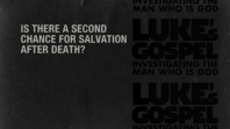
Is There a Second Chance for Salvation After Death?
March 27, 2011

Hell Is Made to Protect Us from the Devil and His Angels
March 27, 2011

You Are In Danger
March 27, 2011
